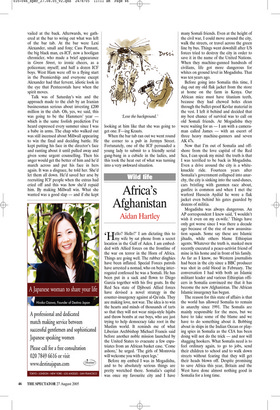Africa’s Afghanistan
Aidan Hartley
‘Hello? Hello?’ I am dictating this to my wife by sat phone from a secret location in the Gulf of Aden. I am embedded with Allied forces on the frontline of the war on terror in the Horn of Africa. Things are going well. The rubber dinghies have been inflated. Special Forces patrols have arrested a nomad, who on being interrogated confessed he was a Somali. He has been put in a sack and flown to Diego Garcia together with his five goats. In the Red Sea state of Djibouti Allied forces have devised a novel strategy in the counter-insurgency against al-Qa’eda. They are making love, not war. The idea is to win the hearts and minds of thousands of tarts so that they will not wear ninja-style hijabs and throw bombs at our boys, who are just trying to help democracy take root in the Muslim world. It reminds me of what Liberian Archbishop Michael Francis said before another noble mission launched by the United States to evacuate a few expatriates from an African basket case. ‘Come ashore,’ he urged. ‘The girls of Monrovia will welcome you with open legs.’ Before my embed I was in Mogadishu, and to be absolutely serious things are pretty wretched there. Somalia’s capital was once my favourite city and I have many Somali friends. Even at the height of the civil war, I could move around the city, walk the streets, or travel across the green line by bus. Things went downhill after US forces tried to destroy the city in order to save it in the name of the United Nations. When they machine-gunned hundreds of civilians, life got more dangerous for whites on ground level in Mogadishu. That was ten years ago.
Before going into Somalia this time, I dug out my old flak jacket from the store at home on the farm in Kenya. Our African mice must have titanium teeth, because they had chewed holes clean through the bullet-proof Kevlar material in the vest. I left it behind and decided that my best chance of survival was to call on old Somali friends. At Mogadishu they were waiting for us — I am with a cameraman called James — with an escort of three heavy machine-gunners and seven AK 47s.
Now that I’m out of Somalia and offshore from the love capital of the Red Sea, I can speak my mind: the truth is that I was terrified to be back in Mogadishu. Even a drive around the city is a whiteknuckle ride. Fourteen years after Somalia’s government collapsed into anarchy, the city is sinking into the sand-dunes, cars bristling with gunmen race about, gunfire is common and when I met the warlord Hussein Aydiid he wore a flak jacket even behind his gates guarded by dozens of militia.
Mogadishu was always dangerous. An AP correspondent I knew said, ‘I wouldn’t wish it even on my ex-wife.’ Things have only got worse since I was there a decade ago because of the rise of new assassination squads. Some say these are Islamic jihadis, while others blame Ethiopian agents. Whatever the truth is, masked men recently executed a peace-activist friend of mine in his home and in front of his family. As far as I know, no Western journalists had been in the city since a BBC producer was shot in cold blood in February. The conversation I had with both an Islamic militant leader and various Ethiopian officers in Somalia convinced me that it has become the new Afghanistan. The African Islamic insurgency has begun.
The reason for this state of affairs is that the world has allowed Somalia to remain in anarchy since 1991. The Somalis are mainly responsible for the mess, but we have to take some of the blame and we have to do something about it. Bobbing about in ships in the Indian Ocean or playing spies in Somalia as the CIA has been doing will not do the trick — and nor will shagging hookers. What Somalis need is to feel ordinary again, to go to jobs, send their children to school and to walk down streets without fearing that they will get their heads blown off. Despite promising to save Africa this year, Britain and the West have done almost nothing good in Somalia for a long time.











































 Previous page
Previous page